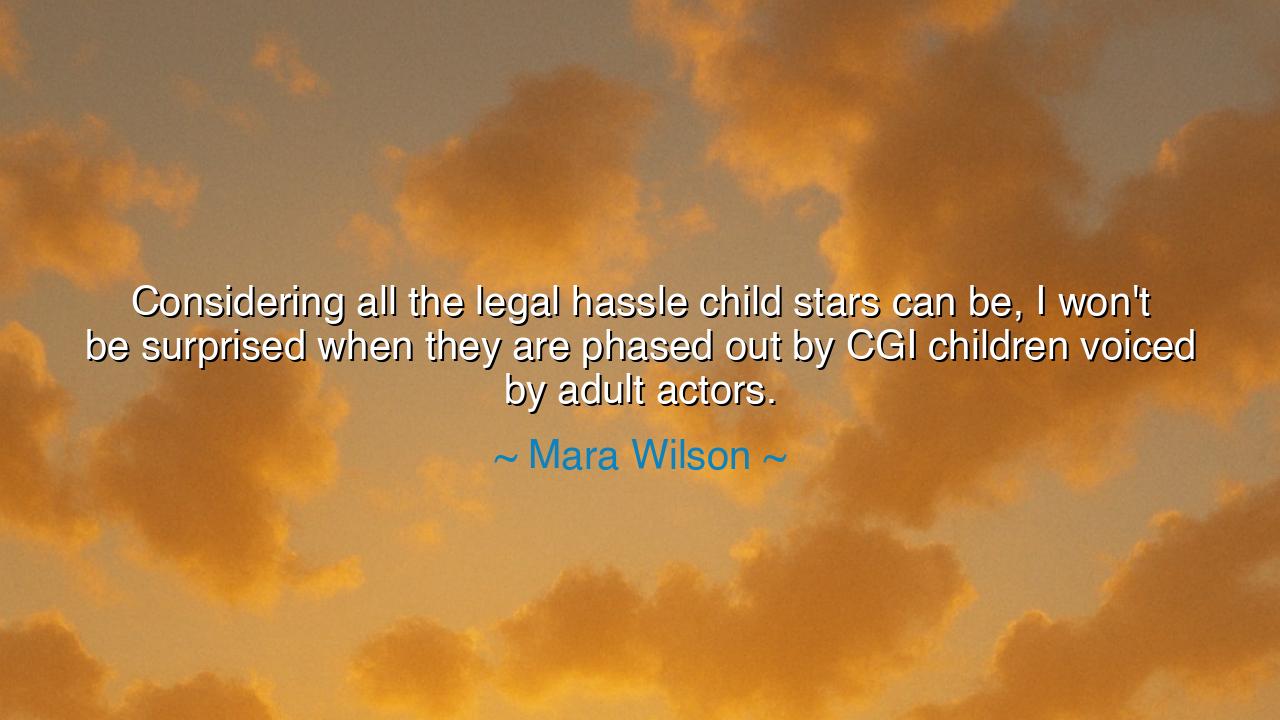
Considering all the legal hassle child stars can be, I won't be
Considering all the legal hassle child stars can be, I won't be surprised when they are phased out by CGI children voiced by adult actors.






When Mara Wilson declared, “Considering all the legal hassle child stars can be, I won't be surprised when they are phased out by CGI children voiced by adult actors,” she spoke with the hard-won wisdom of someone who had lived inside the machine of fame and emerged seeing its shadows clearly. Beneath her wit lies a lament for the loss of innocence — not only the innocence of children who grow up too quickly under the public gaze, but the innocence of an industry that has forgotten what it means to protect its own creation. Her words are both prophecy and critique: prophecy of a world where technology replaces humanity, and critique of a system that drives the young to exhaustion under the guise of entertainment.
The origin of this quote comes from Mara Wilson’s reflections on her experience as a former child actor, known to millions for roles in Matilda and Mrs. Doubtfire. Having witnessed firsthand the legal and emotional turmoil that surrounds young performers, she spoke with the authority of one who has seen the cost of early fame. Hollywood’s relationship with its child stars has always been a troubled one — governed as much by contracts as by care, by profit as by protection. When Wilson speaks of “legal hassle,” she refers to the countless lawsuits, guardianship battles, and rights disputes that plague young performers whose childhoods are traded for careers.
At the heart of her words lies a deep moral question: Can innocence survive in an industry built on performance? The ancients might have recognized in this dilemma the same tragedy that befell those who sought to imitate the divine — those who created beauty but failed to preserve its soul. Just as the sculptor Pygmalion fell in love with his creation, only to realize it could not truly live, so too does modern cinema fall in love with the image of the child while neglecting the living child behind it. Wilson’s warning about CGI children is not merely about technology — it is about the erasure of humanity in art, when compassion gives way to convenience.
Her statement also reflects a profound shift in the nature of creation itself. Once, art depended on the human touch — the trembling emotion of a real voice, the fleeting innocence of a real face. But as technology grows ever more capable of imitation, the temptation to replace reality with simulation becomes irresistible. A CGI child never complains, never ages, never breaks under pressure. Yet what is gained in efficiency is lost in truth. Wilson’s vision of adult actors voicing digital children is chilling because it mirrors the soul of a world that prefers control over authenticity, simulation over suffering, and perfection over growth.
History offers a grim reflection of her insight. The child stars of earlier generations — Judy Garland, Shirley Temple, and countless others — often paid dearly for their fame. Their smiles masked exhaustion; their youth was managed by studios that saw them less as children and more as assets. Even with modern labor laws, the emotional weight remains. Wilson’s statement recognizes that the legal protections meant to shield child performers have themselves become a burden — an endless web of restrictions, contracts, and disputes. Thus, in her wry tone, she foresees an industry that will one day seek to eliminate the problem by eliminating the person.
But within her irony is also sorrow — a sense that the spark of childhood, that ineffable light that once gave cinema its magic, may soon be extinguished by the cold glow of technology. The CGI child may mimic laughter, but it will never truly laugh. It may cry, but no heart will break behind its tears. Wilson’s words remind us that art is sacred because it is human, and that to replace the imperfections of life with digital perfection is to drain meaning from the very stories we tell.
So let this be the lesson passed down: protect the living over the artificial, the innocent over the efficient. Let artists remember that every frame of beauty begins in a beating heart, not in a machine’s rendering. Mara Wilson’s warning is a call to conscience — a plea for compassion in a world eager to automate empathy. The future may well bring digital actors, but it must never bring the death of wonder, nor the abandonment of the children whose laughter first taught the world how to dream. For when art forgets its humanity, it may still entertain — but it will no longer move the soul.






AAdministratorAdministrator
Welcome, honored guests. Please leave a comment, we will respond soon